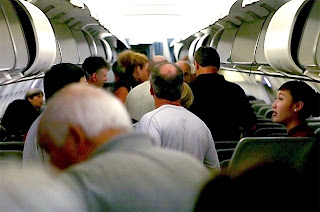A Common Sense Solution to Slow Airplane Boarding
Boarding airplanes has slowed down in recent years, and lately there’s been a lot of chatter about whether airlines can find ingenious, creative, and algorithmic ways to speed up this anxiety-producing process.
The problem is, none of them really work.
Boarding every other window seat first, then middle, then aisle; or the back of the plane first; or from the front and rear at the same time. These solutions are lipstick on a pig. But lipstick doesn’t make a pig fly.
Why? Because speeding up the slow boarding process isn’t about tinkering with the order in which you let people on the plane. It’s about the amount of time passengers spend in the aisle, hefting their bags into the overhead compartments, and stowing them under the seats. The more and bigger bags people bring on, the slower the line moves.
It doesn't help that many carriers now charge $25 for the first checked bag on domestic flights, and more for a second. That amounts to inviting people to carry on luggage instead of paying to check it. So, more passengers bring on bags, and overhead space fills up faster. When the bin space fills up, the crew begins to ask passengers to check luggage at the gate. As air travelers, we know that gate checking neither speeds things up nor calms us down.
Clever algorithms may shave off a minute or two – if they don’t completely confuse passengers first. But if the industry really wants to speed up boarding, it’ll have to stop charging for checked bags. Is that at all likely? With airlines profits under pressure, don’t expect it any time soon.
Baggage fees are what LinkedIn Influencer Fred Reicheld calls “bad profits.” These are earnings that come at the expense of customer relationships. Whenever customers feel mistreated or abused, the profits from that customer are “bad” ones. Naturally, neither accountants nor Wall Street distinguish between good and bad profits. Every dollar of revenue looks the same. But customers remember. As Reicheld points out, average firms book “bad profits” from nearly 1 in 3 customers. In the airline industry, it may be closer to 50% of customers who feel coerced, misled and ill-treated.
At JetBlue we’ve tried to stay clear of the bag charging derby. We do charge $40 for the second checked bag, but since most fliers only need to check one, we think ours is a reasonable approach. Analysts like to remind us that we leave over $100 million on the table every year for that policy. But we’re not asking for a pat on the back: We don't do it as a gift to the traveling public. We do it because we feel that having satisfied, unhurried customers, happier crews, and faster turnarounds for our aircraft will mean better profits in the long run. Plus, our customers don't have to deal with all the nickel-and-diming.
If you remove bad profits from the boarding equation, you remove some of the anxiety of air travel, too. People pay fewer fees, lug around fewer bags, and get on and off planes faster. It’s one less concern to carry on board.
Source: https://www.linkedin.com/today/post/article/20130827063031-11846967-a-common-sense-solution-to-slow-airplane-boarding




Nice Blog,
ReplyDeleteThanks for sharing.
ServiceNow ITOM
ServiceNow ITSM
ServiceNow HRSM
The process of boarding an airplane is frequently lengthy and slow, which causes delays and annoyances for both passengers and airline workers. The process of boarding an airplane is frequently lengthy and slow, which causes delays and annoyances for both passengers and airline workers. Bookkeeping And Accounting Firms In Dubai
ReplyDelete